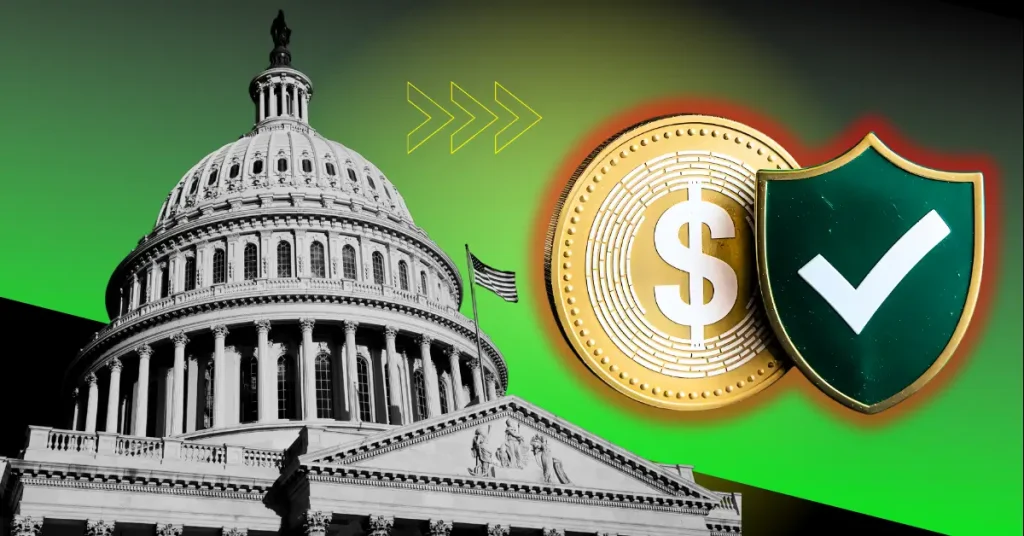Is Meta Planning a Secret Stablecoin? Senators Warren and Blumenthal Demand Answers



The post Is Meta Planning a Secret Stablecoin? Senators Warren and Blumenthal Demand Answers appeared first on Coinpedia Fintech News
Meta’s crypto ambitions are picking up again and U.S. lawmakers aren’t letting it slide.
Senators Elizabeth Warren and Richard Blumenthal have sent a pointed letter to CEO Mark Zuckerberg, demanding full disclosure about the company’s revived interest in stablecoins. The timing is no accident. Their move comes just days ahead of a key Senate vote on stablecoin regulations and Meta, once burned, now finds itself back under the limelight (and not in a good way).
Zuckerberg has until June 17 to respond to eight specific questions about Meta’s crypto strategy, including whether the company is planning to develop its own stablecoin or partner with existing issuers like Circle or Tether.
Here are the deets.
Senators Demand Clarity from Meta
The letter, dated June 12, reflects growing unease in Washington over Big Tech’s creeping involvement in the financial system.
“Big Tech companies’ issuing or controlling their own private currencies, like a stablecoin, would threaten competition across the economy, erode financial privacy, and cede control of the U.S. money supply to monopolistic platforms that have a history of abusing their power,” the senators wrote.
Well, they aren’t wrong. Meta’s influence is already vast. Giving it control over a private digital currency could shift the balance of economic power even further and lawmakers want to stop that before it starts.
What Zuckerberg Is Being Asked to Reveal
Warren and Blumenthal’s questions cover a wide range of concerns.
They want to know which crypto companies Meta is speaking with, whether it’s planning to launch its own stablecoin, and what kind of lobbying the company is doing around digital asset regulation. They’re also seeking Meta’s position on legislation that would restrict Big Tech from controlling stablecoin infrastructure.
This is about drawing a line on how far tech giants should be allowed to go in reshaping the future of money. When you look at it that way, it makes a lot of sense.
Libra, Diem… and Now What?
Meta’s history with stablecoins is already complicated. Back in 2019, it unveiled Libra – later renamed Diem – with plans to create a global digital currency. That effort collapsed under intense political and regulatory pressure. By 2022, the project was shelved and its assets were sold off.
But recent reporting suggests Meta might not be done with crypto just yet.
A May 8 investigation revealed that Meta has been quietly discussing stablecoin integrations across its platforms, including WhatsApp, Facebook, and Instagram, with several crypto companies.
That raised questions about whether Meta is considering another stablecoin push, either through partnerships or a new in-house product.
The Trump Factor: Will the GENIUS Act Help Meta?
One of the senators’ biggest concerns centers on the GENIUS Act, a proposed bill that could give the President power to grant regulatory waivers to certain tech companies.
Warren and Blumenthal warn that Meta could use this route to bypass strict rules particularly if Trump decides to support the company’s crypto plans. If that happens, Meta could gain an advantage that other stablecoin issuers won’t have.
“If Meta controlled its own stablecoin, the company could further pry into consumers’ transactions and commercial activity,” the senators warned, adding that the company could exploit financial data for targeted ads or sell it to third-party brokers.
That does not sound good.
Meta Says “No Stablecoin” – But the Signs Say Otherwise
Publicly, Meta insists it has no stablecoin plans. Communications director Andy Stone stated the Diem project is “dead” and said there’s “no Meta stablecoin.”
But behind the scenes, signs suggest otherwise.
According to Fortune, Meta has been in talks with multiple crypto firms to explore payment options powered by stablecoins. Two key players have emerged: Matt Cavin, a former Web3 gaming executive now at Circle, and Ginger Baker, Meta’s VP of Product with deep roots in crypto including past roles at Ripple and the Stellar Development Foundation.
Both are reportedly involved in discussions focused on building cost-effective, cross-border payment systems. Hmm, interesting.
Who Gets to Shape Digital Finance?
What happens next could do a lot.
The Senate is preparing to vote on stablecoin regulation, and the outcome will likely influence how companies like Meta move forward. For lawmakers like Warren and Blumenthal, keeping Big Tech in check is about preventing long-term dominance in a sector that touches every corner of the economy.
Let’s see how this story shapes up.

Cardano Founder Hoskinson Plans to Use Bitcoin and Stablecoins to Help Cardano Grow
The post Cardano Founder Hoskinson Plans to Use Bitcoin and Stablecoins to Help Cardano Grow appeare...

Altcoin Season 2025: Is the Capital Rotation Already Underway?
The post Altcoin Season 2025: Is the Capital Rotation Already Underway? appeared first on Coinpedia ...

Top Crypto Presales Set to Explode as 2025 Bull Run Begins
The post Top Crypto Presales Set to Explode as 2025 Bull Run Begins appeared first on Coinpedia Fint...

